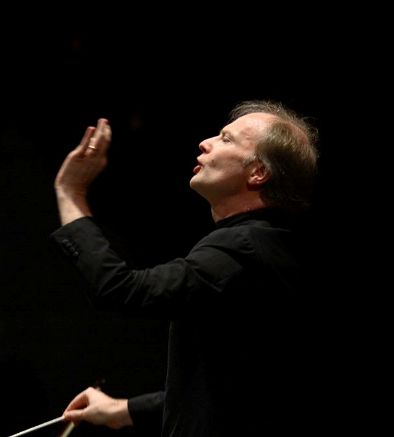Rachmaninoff’s First Symphony receives a belated, electrifying CSO debut

Musical history is full of examples of less-than-stellar premieres, but few first performances attain the disastrous proportions of Rachmaninoff’s Symphony No. 1.
The young Russian composer-pianist’s life up to then had been an unbroken string of successes and rising acclaim, all of which was brought to a screeching halt by the 1897 debut of his First Symphony. Rachmaninoff termed the performance a “fiasco,” claiming for years afterward that Glazunov, who conducted, was drunk. Following the devastating reception, the 22-year-old composer was plunged into a deep depression for three years, during which he composed nothing. A series of hypnosis treatments brought him out of the abyss to compose his Piano Concerto No. 2, which scored instant and lasting international popularity.
Rachmaninoff’s music remains among the most played in the repertoire, yet his First Symphony, the score of which was lost for decades, remains an historical curio, occasionally recorded yet more written about than performed.
The Chicago Symphony Orchestra gave the belated CSO premiere of Rachmaninoff’s Symphony No. 1 Thursday evening under conductor Gianandrea Noseda.
Rachmaninoff wrote only two other works in the genre: the expansive, melody-rich Second, and leaner, more experimental Third. The First Symphony remains something of a novelty, and sounds like no other work in Rachmaninoff’s oeuvre. There is a strangeness and bleak, majestic power in this score, even darker than the Russian gloom in his better-known music.
Yet there are also pre-echos of the mature composer to come, as with the whipcrack scoring, and yearning, long-limbed second theme for strings in the opening movement. The Dies irae—a kind of recurring “fate” motif for Rachmaninoff—is given even greater prominence here than in any of the composer’s other works.
The First Symphony also has more than its share of bizarre moments, particularly in the finale, with several explosive bursts, sudden pauses and, especially, a notably un-triumphant coda with a grinding inexorable string theme repeated ad infinitum.
Gianandrea Noseda, chief conductor of the BBC Philharmonic, clearly believes in this music, and, in his CSO debut, the Italian conductor drew combustible playing from the orchestra to give this weird yet compelling score blazing advocacy. Tall and slender, Noseda directs with broad sweeping gestures and he effectively mitigated the symphony’s weaknesses to put across the explosive, elemental drama. The CSO responded to Noseda with some of their most fiery playing this season, the strings delivering some electrifying moments at blinding tempos.
Another CSO premiere was heard in the first half with Kaija Saariaho’s Orion. Written in 2002, Orion is cast in three unbroken movements, the Finnish composer taking her inspiration from the duality of the violent Greek myth of the hunter as well as the heavenly constellation that bears his name.
Scored for massive forces (including Brobdingnagian percussion brigade, piano and organ), the music is wholly characteristic of Saariaho , the composer using her vast resources to produce a cool, austere brilliance of great tonal delicacy and pointillist hues.
Noseda led a powerful, skillfully balanced performance, which was at its finest in the closing section where the music spins out of control like an overwound clock, the coda accelerating as the music draws down to a hush.
Elsewhere, however, the Italian conductor seemed less convincing, his emphatic style rather literal for Saariaho’s Northern sensibility, the shimmering textures and evanescent quality feeling too boldly outlined and lacking an essential mystery. No quibbles about the CSO members, who tackled this demanding score with characteristic polish and full-metal intensity, the hard-working percussionists at their finest.
The centerpiece of the evening was Beethoven’s Piano Concerto No. 3 with Radu Lupu as soloist.
Following a lackluster January recital on the same stage, Lupu’s dull-as-paint Beethoven on Thursday makes it hard to avoid the feeling that the great Romanian pianist’s artistry is in an eclipse.
As in his recital, there was a distinct lack of power and personality, with Lupu playing with an unvaried, light Mozartean style. That can be valid in Beethoven’s first two concertos, but there is ample rugged minor-key drama in this music that was barely tapped.
Apart from a burst of vigor in the extended first-movement cadenza and some fleeting sparkle in the finale, there was little charm, wit or even involvement by Lupu with an Olympian detachment and blandness prevailing. Noseda tried to enliven the proceedings with his dynamic accompaniment, but this was another sad outing from Lupu.
The program will be repeated 8 p.m. Friday, 8 p.m. Saturday and 7:30 p.m. Tuesday. www.cso.org; 312-294-3000.
Posted in Uncategorized


Posted Mar 04, 2010 at 3:37 pm by richard tribble
I would term Mr. Noseda’s conducting as frenetic and helter skelter, hard to follow and void of contrasts. Hopefully the powers that be won’t invite either of them back in the future.
Posted Apr 25, 2010 at 3:14 pm by wesley
Rachminoffs first symphony is to me at least as good as any beethoven symphony, the description of the coda as untriumphant makes no sense either its more like a massive almost solar fanfare that dies down to the finish.